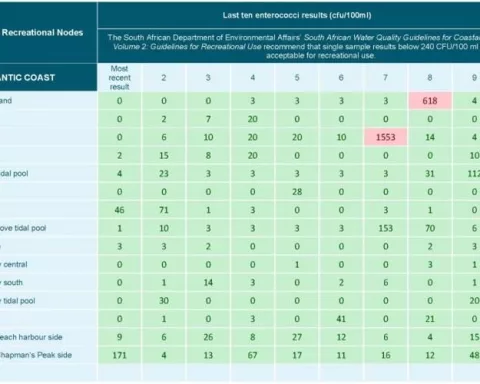Cape Town is leading the way in climate resilience in Africa, having been declared Africa’s premier city for climate action by the Carbon Disclosure Project. The city is committed to reducing greenhouse gas emissions and improving energy and water security, with a policy-level goal to achieve carbon neutrality by 2050. Cape Town consistently earns an A-list ranking from the CDP, setting an example for other cities to follow in their efforts towards sustainability. Despite facing numerous climate challenges, Cape Town’s unwavering dedication to sustainability serves as a beacon of hope in the face of the climate change crisis.
Cape Town: A Shining Example of Climate Resilience in Africa
– Cape Town declared as Africa’s premier city for climate action by the Carbon Disclosure Project (CDP).
– The city’s commitment to climate action is reflected in its ambitious R120 billion infrastructure portfolio.
– Cape Town aims to improve energy and water security while reducing greenhouse gas emissions.
– The city has set a policy-level goal to achieve carbon neutrality by 2050 and consistently earns an A-list ranking from the CDP.
– Cape Town’s efforts towards sustainability set an example for other cities to emulate.
In the face of mounting climate change, Cape Town has risen as a beacon of environmental responsibility. The Carbon Disclosure Project (CDP) declared Cape Town as Africa’s premier city for climate action in their 2023 Cities A-List. This esteemed honor, given by a leading global non-profit that manages the world’s environmental disclosure system, underscores Cape Town’s continued dedication to controlling greenhouse gas emissions and preparing for climate-related risks effectively.
The A-list Rating: A Testament to Cape Town’s Environmental Stewardship
From the 930 plus cities evaluated, a mere 13% succeeded in fulfilling the stringent criteria required for the A rating. This A-list rating not only acknowledges Cape Town’s environmental endeavors but also provides an essential signal to international financiers and monetary institutions. These entities, with a keen focus on aligning their investments with eco-friendly initiatives, factor in this transparency in climate action during their investment decision-making process.
Cape Town’s unwavering commitment to climate action is at the heart of its ambitious R120 billion decade-long infrastructure portfolio. This plan includes significant climate action projects targeted at boosting energy and water security. Cape Town is at the threshold of a transformative energy transition, veering away from unreliable, expensive, and carbon-intensive energy towards a more dependable, cost-effective, and carbon-neutral alternative.
Climate-Smart Energy and Water Security
In the foreseeable future, the city is determined to improve its energy security by augmenting up to 650MW to its grid, enough to safeguard against four Eskom load-shedding stages by 2026. Simultaneously, Cape Town is investigating alternate water resources, aiming to supplement approximately 300 million litres per day by 2030.
According to the CDP, A-list cities like Cape Town are implementing four times more mitigation and adaptation measures compared to non-A List cities. For a city to earn an A rating, it must publicly disclose its climate actions, maintain a city-wide emissions inventory, publish a climate action plan, and undertake a climate risk and vulnerability assessment. Moreover, the city must establish a tangible, attainable climate adaptation objective to effectively address looming climate threats.
Carbon Neutrality: A Pioneering Endeavor
Cape Town has consistently earned an A-list ranking since the CDP’s new rating system was introduced in 2019, signifying the city’s unwavering commitment to climate action. This dedication is further emphasized by the city’s policy-level goal to attain carbon neutrality by 2050. This ambitious objective is embedded in the city’s Climate Change Strategy and corresponding Action Plan, outlining the roadmap towards achieving carbon neutrality.
Carbon neutrality, an increasingly prevalent concept in climate discussions, involves the adoption of innovative technologies aimed at eradicating emission-producing fuels and activities that exacerbate global warming. In this regard, Cape Town is not only reducing its contribution to climate change but is also advancing its social, economic, and environmental aims.
Overcoming Climate Challenges: A Precedent for Others
Cape Town grapples with numerous climate issues, including diminishing rainfall, increased drought risk, hotter temperatures, escalating sea levels, intensified coastal erosion, potential flooding due to heavy rainfalls, and heightened wildfire threats owing to hot, dry, windy conditions. By addressing these issues, Cape Town is not only safeguarding its future but also setting an example for other cities to emulate.
In summary, Cape Town’s pragmatic efforts towards achieving carbon neutrality, allied with its transparency in climate action, serve as a testament to its dedication to sustainability. The journey to carbon neutrality is filled with obstacles. However, Cape Town’s steadfast march provides a beacon of hope amidst the climate change crisis.
1. What is Cape Town’s ranking in the Carbon Disclosure Project’s Cities A-List?
Cape Town has been declared Africa’s premier city for climate action by the Carbon Disclosure Project’s Cities A-List.
2. What is Cape Town’s goal for carbon neutrality?
Cape Town has set a policy-level goal to achieve carbon neutrality by 2050, as part of its Climate Change Strategy and corresponding Action Plan.
3. What is Cape Town doing to address energy and water security?
Cape Town is taking significant measures to improve energy and water security, including augmenting up to 650MW to its grid by 2026 and supplementing approximately 300 million litres of water per day by 2030.
4. What are the criteria for a city to earn an A-list rating in the Carbon Disclosure Project’s Cities A-List?
For a city to earn an A-list rating, it must publicly disclose its climate actions, maintain a city-wide emissions inventory, publish a climate action plan, undertake a climate risk and vulnerability assessment, and establish a tangible, attainable climate adaptation objective.
5. What challenges is Cape Town facing in terms of climate?
Cape Town is facing numerous climate challenges, including diminishing rainfall, increased drought risk, hotter temperatures, escalating sea levels, intensified coastal erosion, potential flooding due to heavy rainfalls, and heightened wildfire threats.
6. Why is Cape Town’s commitment to sustainability significant?
Cape Town’s unwavering dedication to sustainability serves as a beacon of hope in the face of the climate change crisis and sets an example for other cities to follow in their efforts towards sustainability.












